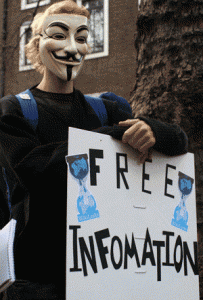15 Dec 2020 | News
[vc_row][vc_column][vc_column_text]

Justice for Assange campaign protester outside a court hearing in 2010. Photograph: Nadia Cosentino
Assange’s partner, Stella Moris, is remaining resolute despite his extradition hearing decision being less than a month away and him being held in a prison that has recently had a Covid-19 outbreak.
Speaking over the phone to Index, Moris discusses the hearing’s details and what it could mean for the future of freedom of expression. And she talks about the deep implications it has had for her and her young family.
“Obviously it is very difficult. I speak to Julian on a daily basis unless there is a problem. [But] he is in prison. Soon to be for two years. He has been there for longer than many violent prisoners who are serving sentences. All in all, he has been deprived of his liberty for ten years now,” she told Index. She adds:
“The kids speak to their father every day; we try to normalise it as much as we can for them. But of course, this is not a normal situation and our lives are on hold. It is inhumane and shouldn’t be happening in the UK.”
The current hearing – which will decide whether there are grounds for Assange to stand trial in the USA – should reach a conclusion on 4 January. A trial in the USA (should the decision go against Assange) will have major ramifications for free speech and whistleblower journalism.
The WikiLeaks founder is charged with conspiring with US intelligence analyst Chelsea Manning and hackers from groups such as Anonymous and LulzSec to obtain and publish classified information. Each of the 18 charges laid by US authorities, if Assange is extradited and convicted, carry a maximum penalty of 10 years. The allegations brought forward under the 1917 Espionage Act, alongside one other under the Computer Fraud and Abuse Act, mean Assange could face up to 175 years in prison – effectively a life sentence. Manning was initially sentenced to 35 years, but under the Obama administration her sentence was commuted to less than seven years.
It is easy to get sidetracked about the current extradition hearing and get into arguments about whether Assange is a journalist, whether he is guilty of other crimes or whether the publication of the documents brought harm to anyone involved. Instead people’s attentions should focus on the precedent that will be set should the case go to trial in the USA.
As it stands the case is unprecedented. No publisher has ever been tried under the Espionage Act, which itself was essentially created for spies imparting official secrets either for profit or otherwise. This is perhaps a direct contradiction of rulings of the courts in the UK. In December 2017, the UK’s information tribunal recognised WikiLeaks as a media organisation, in direct contradiction to the view of the US State Department. Australia’s media union, the Media, Arts and Entertainment Alliance, also presented an honorary member card to Assange’s Melbourne-based lawyer.
Amidst the noise of the separate matters around the case, Moris insists people need to “forget what they think they know” and assess the issues involved.
“There are a lot of assumptions being made over what this case is really about. There are all these sideshows. It is not about people being harmed because the US has admitted it has no evidence to make this argument. It comes down to the fact that the material published was classified. People who care about free speech and press freedom need to forget what they think they know about this case and look at it afresh and understand Julian is in prison for publishing. This is not something that democracies do.”
“Are they saying what he published was not in the public interest? They say that is irrelevant. They can’t deny [what he published] wasn’t in the public interest because he was publishing information and evidence of state crimes, of state abuse, torture, of rendition, blacksites and of illegal killings. What they are arguing is that Julian published information that was secret and therefore he can be prosecuted over it.”
Journalists publishing secret information is not new (nor is pressure for them not to publish) and can often be key to upholding democracy and ensuring states act properly. The Watergate revelations relied heavily on news organisations pressing on with publication despite attempts by the USA to stop them, including the threat of jail time. It proved a significant victory for free speech.
If Assange is extradited and tried the case will impact journalists and the media “for years to come”, says Rebecca Vincent, director of international campaigns at Reporters Without Borders (RSF).
“It feels like many in the media do not see the implications of this case as something that will possibly affect them,” she told Index. “This case will have ramifications on the climates for journalism and press freedom internationally for years to come.”
“This is the first time we have seen the US government prosecute anybody for publishing leaked information. If they are successful, they will not stop with Assange and WikiLeaks. This could be applied, in theory, to any media outlet.”
It’s common for journalists and publishers to cite a public interest defence for disputed documents. It is a centrepiece of a defence case against libel, for instance.
“The information published was certainly in the public interest; it served to inform extensive public interest reporting that exposed war crimes and other illegal actions by states,” said Vincent.
“The Espionage Act lacks a public interest defence. He cannot use it if he is sent to the United States and tried.”
Essentially, what this means is that Assange is being treated as a spy not a publisher. If Assange is extradited and loses his case against the US government, any time classified information is published by a journalist there will be a precedent set that they can be charged and tried as a spy in the same way.
“These sorts of cases are really highlighting the need for more robust legislation that cannot be manipulated to be used against journalists, whistleblowers and other sources. Ultimately, it is the public’s right to access information that is being impacted,” Vincent added.
“You can see this for what it is; this very much feels like a political prosecution by states that are not meant to engage in this behaviour. The reason our states can get away with this is because of a lack of public pressure. A lack of public sympathy has resulted in a lack of widespread public pressure to hold our governments to account.”[/vc_column_text][/vc_column][/vc_row]
23 Oct 2020 | Opinion, Ruth's blog
[vc_row][vc_column][vc_single_image image=”115302″ img_size=”full” add_caption=”yes”][/vc_column][/vc_row][vc_row][vc_column][vc_column_text]Samuel Paty
An educator.
A father.
A martyr.
An inspiration.
Last week Professor Paty was brutally murdered in a Parisian suburb for teaching his students about the basic human right of free speech. A right that is protected by both the French constitution and the European Human Rights Act. A right that we cherish and celebrate.
Our hearts bleed for the pain and sorrow that this tragedy has visited upon his loved ones and the people of France. We stand with them.

Samuel Paty, photo: Ville de Conflans Saint Honorine
No context is or should be required to try and understand this horrendous act. There are no excuses, justifications or mitigations. Professor Paty was doing his job. He was a citizen of the world, educating the next generation about the importance of speech, of language, imagery and art, and their protected place in society. This was a public service undertaken in a public space. He was doing his duty and he was assassinated for it.
As we mourn Samuel’s loss, 14 French citizens are on trial for the massacre at the Charlie Hebdo offices. A further seven people have been arrested related to Samuel’s murder. These people do not represent France. Samuel Paty represents France. These people represent extremists. Samuel Paty represents the mainstream. Those arrested represent hate and fear. Samuel Paty represents hope.
There will be lots or recriminations in the months and years ahead: politicians attempting to exploit people’s fears for their own gain, others trying to excuse or apologise. Neither is acceptable. As a society, it is vital that we come together to celebrate our shared values, in spite of every effort made by some to undermine and attack those values.
In the months ahead Index will continue to report on the Charlie Hebdo case. We will highlight the efforts of French leaders who, in the face of terror, stand tall and use their free speech to protect ours.
And most importantly we will remember.
Samuel Paty, 1973-2020.
He will never be forgotten. We mourn his loss together and we must remember his legacy every time someone tries to undermine or restrict our free speech.[/vc_column_text][/vc_column][/vc_row][vc_row][vc_column][three_column_post title=”You might also like to read” category_id=”581″][/vc_column][/vc_row]
22 Oct 2020 | Free Speech and the Law, News, Uncategorized, United States
[vc_row][vc_column][vc_column_text]

Rachel Malehorn, WikiCommons
As Amy Coney Barrett’s nomination to the Supreme Court advances to the Senate – despite a boycott from Democrats – it is still unclear where she stands on free speech.
Coney Barrett did little to allay fears over her positions on key constitutional issues during her confirmation hearings for the vacant seat on the US Supreme Court.
Members of the Senate Judiciary Committee questioned the judge on issues including free speech and the First Amendment.
The First Amendment gives five separate protections to citizens. Namely the freedoms of speech, religion, press, protest and redress.
When asked by Republican Senator Ben Sasse what the freedoms protected by the amendment are, Coney Barrett was unable to recall the latter.
The freedom of redress gives citizens of the USA the right to petition or complain to government authorities at the federal, state and local level without fear of reprisals or punishment. It is a vital part of the constitution and very much a contemporary issue.
There has been extra scrutiny on issues around the First Amendment ever since the protests against the killing of George Floyd broke out in May this year.
With the typical rigour of judicial committee hearings, Coney Barrett could be forgiven for what was likely an innocent slip-up. However, the response will have done little to calm the nervousness over her appointment from free speech campaigners and members of the press.
The judge, 48, does not have an extensive record on dealing with with issues of First Amendment freedoms and her position on them has therefore been difficult to interpret.
On whistleblower cases, for example, Coney Barrett has joined different sides of the debate in different cases.
In August this year, Coney Barrett’s court favoured the First Amendment and the right of a public employee to raise alarm. However, in the case of Kelvin Lett, a Chicago investigator who refused to change a police report under direction from his supervisor, Coney Barrett ruled: “Lett may have had a good reason to refuse to amend the report [but this] does not grant him a First Amendment cause of action.”
On other issues, Coney Barrett was repeatedly accused of being “evasive” during the hearings, particularly on more controversial matters; the Democrats have repeatedly alluded to her Catholic faith as a potential problem.
However even before her nomination, she has expressed her belief in the importance of the separation of church and state.
“I think one of the most important responsibilities of a judge is to put their personal preferences and beliefs aside. Our responsibility is to adhere to the rule of law,” she said.
The Trump administration has faced repeated criticism from free speech groups since taking office in 2016. Among the criticisms are the crackdown on Black Lives Matter protests across the country, as well his repeated attacks on press freedoms.
Index, along with other free speech organisations have raised concerns over harms to media freedom in the country and in particular since the outbreak of the coronavirus pandemic.
The US Press Freedom Tracker has logged 219 journalists attacked, 62 equipment damages, 71 journalists arrested and over 10 occasions where equipment was searched or seized in this year alone.
As Trump’s Supreme Court nominee, these issues naturally fell on Coney Barrett to talk at length on during the hearings, but she gave little insight into her stance on media freedom.
Coney Barrett’s addition would give the Supreme Court a 6-3 conservative majority, heightening concern over the consequences of Trump’s potential election victory and the impact on policy should Joe Biden win instead.[/vc_column_text][/vc_column][/vc_row]
7 Oct 2020 | Index in the Press
[vc_row][vc_column][vc_column_text]Index on Censorship CEO Ruth Smeeth has voiced her concerns regarding the proposed Online Harms Bill. Smeeth wrote in The Independent that the legislation, though well intentioned, would risk campaigning for ‘cultural change’ and thus have a further impact on freedom of expression online.
“If that’s the case, then as a former politician I worry about the concept of legislating for cultural change,” Smeeth said, herself a victim of online abuse. “There is absolutely a problem online and it is causing real harm, but banning language rather than engaging in education programmes screams as a political fix rather than an actual solution.”
Read the full article here.[/vc_column_text][/vc_column][/vc_row]



